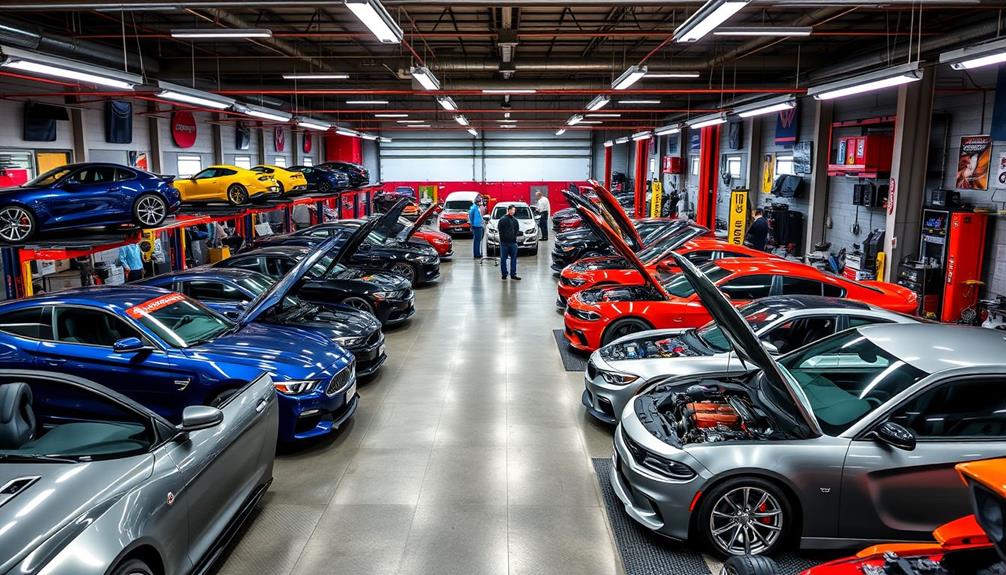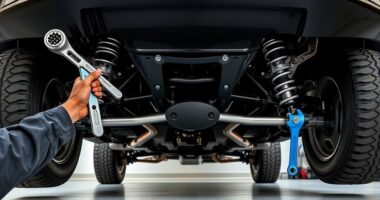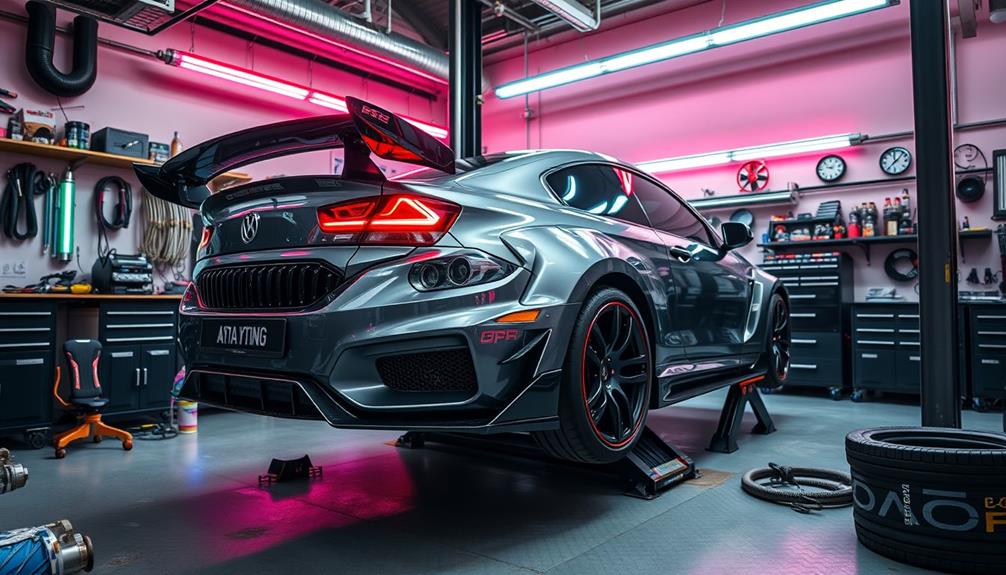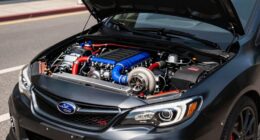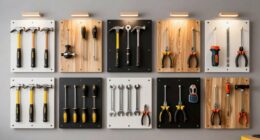A car tuning business can bring in impressive profits, typically between $100,000 and over $500,000 each year. Your earnings largely depend on the services you offer and your target market. Specializing in high-performance vehicles often leads to profit margins exceeding 30%. Factors like seasonal demand, skilled labor, and effective marketing can greatly influence your bottom line. Additionally, a combination of aftermarket parts sales and installation services can boost your revenue. If you're curious about the strategies that can enhance your profitability in this exciting industry, there's much more to explore. For example, offering customizable tuning packages or partnering with local car dealerships to provide tuning services for their customers can help drive up your profits. Additionally, establishing a strong online presence and utilizing social media platforms to showcase your work and connect with potential customers can also impact your earnings positively. In the competitive world of the car tuning business, finding unique ways to differentiate yourself and provide exceptional value to your clients can ultimately lead to increased financial success.
Key Takeaways
- Annual revenues for tuning shops generally range from $100,000 to over $500,000, depending on services offered and clientele.
- Profit margins typically vary between 20% to 50%, influenced by service types and operational efficiency.
- Specializing in high-performance vehicles can yield profit margins exceeding 30%.
- Seasonal demand can boost revenues by 20-30% during peak months, especially around motorsport events.
- Effective inventory management and strategic marketing can enhance profitability by up to 30%.
Overview of Car Tuning Industry
The car tuning industry is booming, with a global market valued at around USD 6.4 billion in 2023. This impressive growth reflects a growing consumer desire for vehicle personalization, performance enhancements, and aesthetic modifications.
As you explore this dynamic market, you'll notice that passenger vehicles dominate, accounting for over 62% of the market share. Hardware components, in particular, are expected to represent more than 52% of the overall market in 2023.
Trends in the car tuning industry are heavily influenced by the increasing popularity of motorsports and car shows, which drive consumer spending on aftermarket parts. This demand fosters innovation and diversity in the products available, catering to a wide range of tastes and performance needs.
Additionally, the rise of electric vehicles (EVs) is opening up new avenues for tuning, as enthusiasts seek specialized software and performance enhancements tailored for these modern machines.
With projections estimating the market will reach USD 12 billion by 2033, the car tuning industry presents substantial opportunities for those looking to capitalize on these trends and meet the evolving demands of consumers.
Revenue Potential for Tuning Shops

Car tuning shops represent a lucrative business opportunity, with annual revenues typically ranging from $100,000 to over $500,000. The revenue potential largely depends on your location, service offerings, and customer base.
If you specialize in high-performance vehicles, you could see profit margins exceeding 30%, thanks to premium services and top-quality parts. Implementing a holistic SEO approach can also enhance your business visibility, attracting more customers and increasing sales.
By combining aftermarket parts sales with installation services, you can enhance your revenue by up to 40% through diversified income streams. Don't overlook the power of e-commerce channels; they're projected to account for over 66.5% of the market share, greatly boosting your overall income.
Keep an eye on seasonal trends, too. Demand for performance upgrades typically spikes during the spring and summer months, which can lead to revenue increases of 20-30%.
Factors Influencing Profit Margins
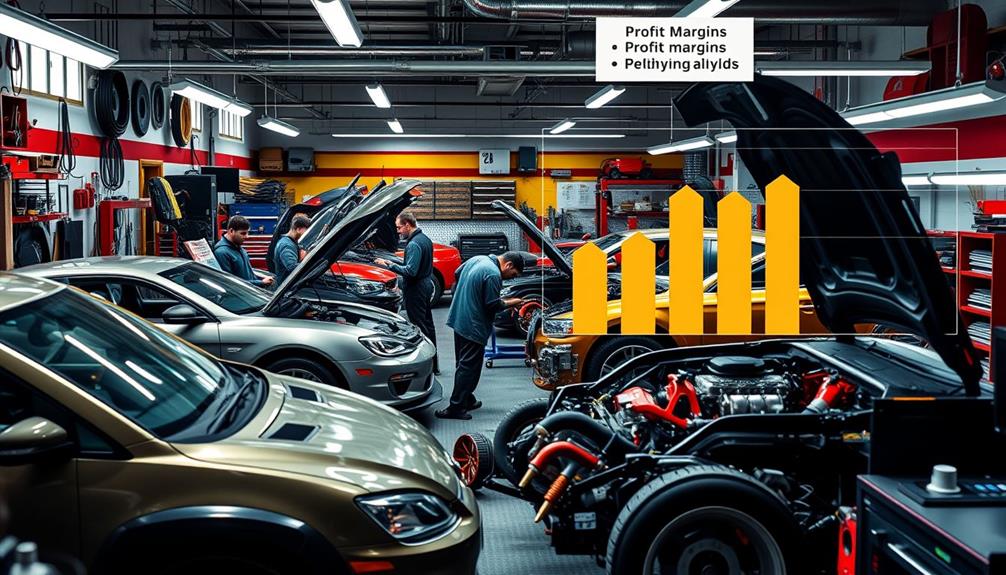
Profit margins in the car tuning business can fluctuate widely, influenced by several key factors. Typically ranging from 20% to 50%, these margins depend heavily on the services offered and the level of customization involved. If you focus on high-end performance modifications, you can drive greater revenue, but keep in mind that these often require more skilled labor and specialized equipment, which can raise your operating costs.
Additionally, as with many industries, the integration of advanced technologies, such as AI-driven solutions, can enhance efficiency and customer experience in automotive services, potentially leading to increased profitability in the long term. For example, AI Cybersecurity Jobs can help guarantee that business data and customer information are protected, allowing for a more trustworthy operation.
Seasonal demand also plays a noteworthy role. You'll notice peaks in sales during warmer months and around vehicle purchasing times or motorsport events, which can greatly impact your profitability. Managing your operating costs effectively is essential; using high-quality components and employing experienced technicians can increase expenses, so balance these choices wisely.
Moreover, strategic marketing and strong customer engagement can enhance your profit potential. Building an effective online presence and running promotions can lead to increased sales and foster customer loyalty in a competitive market.
Types of Services Offered

In the world of car tuning, you'll find a diverse array of services designed to enhance both performance and aesthetics. One of the most sought-after services offered is engine remapping, which can greatly boost horsepower and torque. Depending on the vehicle and complexity, prices typically range from $300 to $1,500.
Custom exhaust systems also contribute to a shop's revenue, with installation fees averaging between $500 and $2,000.
Suspension upgrades, including coilovers and performance shocks, are popular, too, costing anywhere from $800 to $3,000 depending on the brand and vehicle type.
Aesthetic modifications, such as body kits and custom paint jobs, can further elevate your offerings. Prices for these modifications often start around $1,000 and can soar up to $10,000 for high-end options.
Additionally, offering maintenance and repair services alongside tuning can enhance your profitability. These services can generate steady income, with labor costs billed at $100 to $150 per hour.
Market Demand and Trends
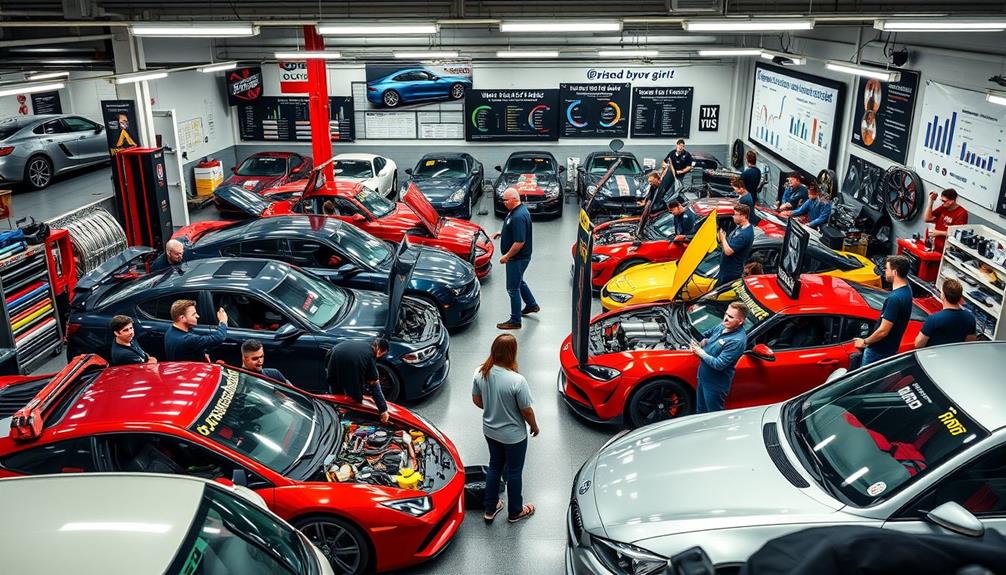
The demand for car tuning is on the rise, driven by consumers keen to personalize their vehicles and enhance performance.
With online shopping for automotive parts booming, you can tap into this trend to boost your sales and reach more customers.
Plus, the growing interest in motorsports and car shows adds to the excitement, making tuning more popular than ever.
Growing Tuning Popularity
Car tuning is gaining momentum as enthusiasts seek to enhance both performance and aesthetics of their vehicles. The global car tuning market size was valued at approximately USD 6.4 billion in 2023, with projections to reach USD 12 billion by 2033, showcasing the growing demand for tuning services.
Aftermarket parts dominate this landscape, accounting for over 62% of the market share, indicating strong consumer preferences for enhancing vehicle performance.
The rise of electric vehicles (EVs) is also creating new opportunities within the tuning market. As consumers pursue performance upgrades and software enhancements tailored specifically for EVs, tuning trends are evolving to meet these demands.
Additionally, the popularity of motorsports and car shows cultivates a vibrant community of enthusiasts enthusiastic to personalize their rides with innovative aftermarket modifications.
This shift in the automotive industry is more than a trend; it reflects a fundamental change in how consumers view their vehicles. As the demand for tuning grows, so does the potential for your car tuning business to thrive in this lucrative market.
Embrace these trends, and you'll be well-positioned to capitalize on the excitement surrounding car tuning.
E-commerce Influence on Sales
As e-commerce continues to reshape the retail landscape, it's clear that the car tuning market is experiencing a significant transformation. With e-commerce channels projected to account for 66.5% of the car tuning market share, you can see how consumer preferences are shifting towards online shopping for convenience and discounts.
The surge in online sales of aftermarket parts stems from the increased availability of home delivery options, which enhances engagement in the automotive tuner market. This trend is further supported by the rise of best ways to make money online through online platforms, allowing businesses to reach a wider audience.
Younger consumers are particularly driving this trend, as they increasingly turn to digital marketplaces for their tuning needs. This shift in purchasing behavior highlights a growing preference for online shopping over traditional retail methods.
The global automotive tuner market, valued at US$ 6.4 billion in 2023, is expected to see considerable growth as e-commerce platforms make it easier for customers to access tuning products.
In this evolving landscape, your car tuning business can thrive by embracing e-commerce strategies, tapping into the demand for aftermarket parts, and catering to the preferences of a tech-savvy clientele.
The future of your business lies in adapting to these changing dynamics.
Operating Costs and Expenses
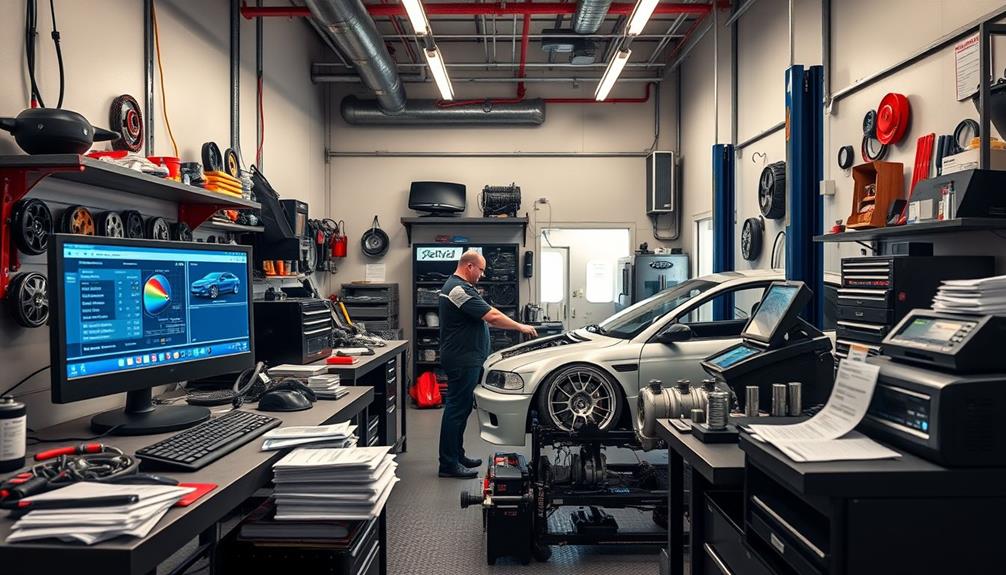
When starting your car tuning business, you'll need to keep a close eye on operating costs and expenses.
You'll face significant expenses related to inventory and supplies, labor and staffing, as well as facility and equipment.
Understanding these costs is essential for maximizing your profits and ensuring long-term success.
Inventory and Supplies Management
Managing inventory and supplies effectively is essential for maximizing the profitability of your car tuning business. Your operating costs can range from $10,000 to $50,000 annually, and a significant portion of that comes from aftermarket parts and accessories.
You'll want to invest about 15-25% of your revenue in these components to stay competitive and meet customer demands.
Implementing robust inventory management practices, like conducting regular audits and monitoring turnover rates of 6-12 times per year, will help you minimize excess stock. This guarantees that popular tuning components are readily available, enhancing customer satisfaction.
Effective supply chain management is equally important. By fostering strong relationships with suppliers, you can negotiate discounts and achieve bulk purchasing, which can reduce costs by 10-20%.
A well-planned inventory system can lead to a 20-30% increase in profitability by optimizing stock levels and reducing holding costs.
Ultimately, managing your inventory and supplies efficiently not only reduces expenses but also improves your ability to serve customers promptly, driving loyalty and repeat business.
Labor and Staffing Costs
Labor and staffing costs are a significant factor in the overall expenses of your car tuning business, often accounting for 30-50% of total operating costs. To maintain profitability, you need to carefully manage these expenses.
When hiring skilled technicians, salaries can range from $40,000 to $70,000 annually, and additional staffing costs like benefits and insurance can increase expenses by 20-30%. Training programs are also essential; investing $1,000 to $5,000 per technician guarantees high service quality and compliance with industry standards.
Seasonal fluctuations in demand mean you may need to hire temporary or part-time staff, which could impact labor costs by an extra 10-20% during peak periods.
Here's a quick overview of how these costs break down:
| Expense Type | Estimated Cost Range | Impact on Profitability |
|---|---|---|
| Skilled Technicians | $40,000 – $70,000 | High |
| Benefits & Insurance | +20-30% of salaries | Medium |
| Training Programs | $1,000 – $5,000 | High |
Facility and Equipment Expenses
In establishing your car tuning business, understanding facility and equipment expenses is essential for sustaining profitability. Your initial investment could range from $50,000 to $200,000, covering equipment, tools, and facility setup. This upfront cost lays the foundation for your operations.
Monthly operating expenses are another crucial factor. You can expect to pay between $2,000 and $10,000 for rent, utilities, and insurance, depending on your location and facility size. Equipment costs, particularly for diagnostic tools and tuning software, can add another $5,000 to $50,000 to your budget. These tools are essential for delivering quality service.
Don't forget about maintenance and repair costs, which can increase your operating expenses by 10-15% annually, emphasizing the importance of budgeting for upkeep.
Additionally, labor costs will account for 30-50% of your total expenses, with skilled technicians earning between $20 and $50 per hour.
These factors combined will greatly impact your overall profitability. By carefully managing these facility and equipment expenses, you can create a sustainable business that thrives in the competitive car tuning market.
Target Customer Demographics
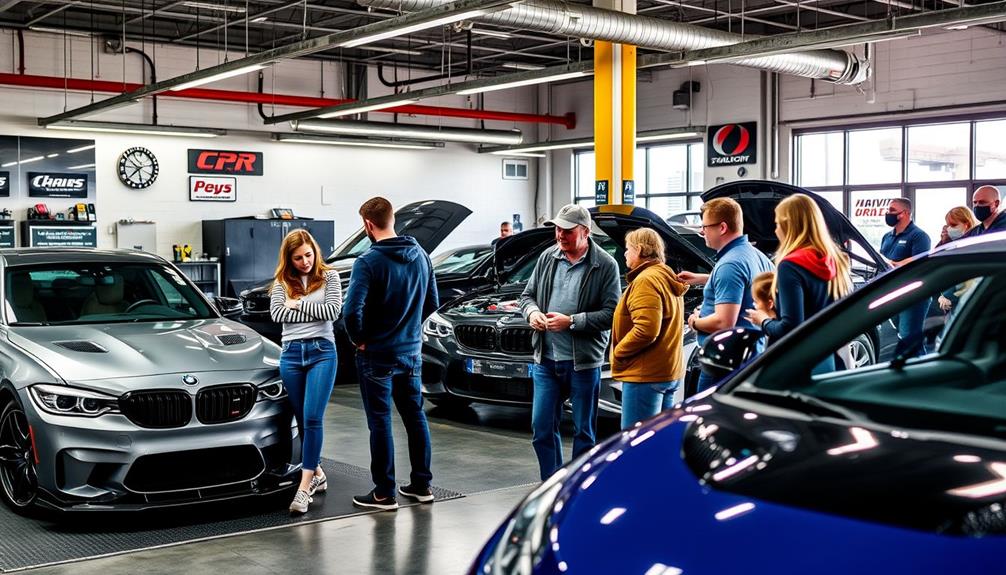
A significant portion of car tuning businesses targets millennials and Gen Z, who crave unique ways to express themselves through vehicle personalization and modifications. These demographics are particularly drawn to aftermarket modifications that allow them to stand out.
With over 62% of the car tuning market share coming from passenger vehicle owners, it's evident that everyday drivers are seeking performance enhancements tailored to their preferences. Furthermore, just as dog owners look for healthy snacks for happy pets to keep their furry friends engaged, car enthusiasts are also on the lookout for innovative products that enhance their driving experience.
As you navigate this market, it's important to understand that your target customers often possess a disposable income, enabling them to invest in aftermarket parts. This trend is especially pronounced in regions with growing middle-class populations.
Car enthusiasts, including those involved in motorsports and car shows, represent a substantial portion of your clientele. They're typically willing to spend more on high-performance tuning products and services.
Additionally, urban environments are increasingly attracting younger consumers who prioritize vehicle differentiation and customization. Their desire for unique vehicles drives the demand for tuning businesses, offering you a promising opportunity to cater to these specific customer preferences.
Emphasizing your understanding of these demographics can help you tailor your offerings and marketing strategies effectively.
Competitive Landscape Analysis
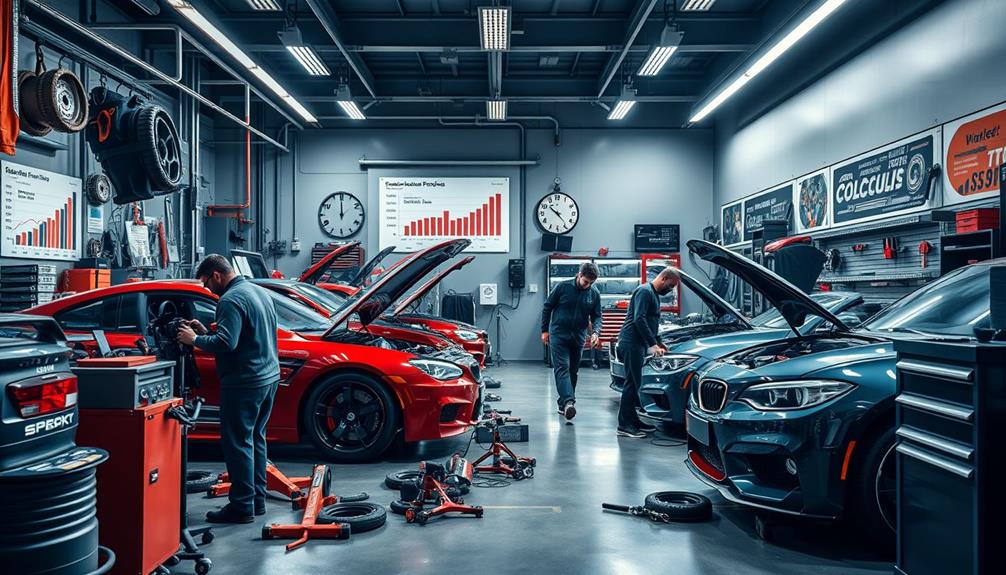
Steering through the competitive landscape of the car tuning market reveals a dynamic environment ripe with opportunities and challenges. With the market projected to reach USD 12 billion by 2033, your profit potential is significant. Key players like HP Tuners, Cobb Tuning, and Alientech SRL are actively employing strategies such as mergers and acquisitions to strengthen their market positions.
The landscape features a mix of established manufacturers and innovative start-ups, driving product diversification and enhancing market share. E-commerce is increasingly important, with online sales expected to account for a substantial portion of the market as consumer preferences shift toward convenience.
Here's a quick overview of the competitive landscape:
| Market Players | Strategies by Key Players |
|---|---|
| HP Tuners | Mergers and Acquisitions |
| Cobb Tuning | Organic Growth |
| Alientech SRL | Research and Development |
| Utune and Kfzteile24 | Innovative Product Offerings |
Continuous innovation and strategic partnerships are essential for all market players. By focusing on advanced tuning solutions, you can effectively meet evolving consumer demands and carve out your niche in this promising tuning market.
Marketing Strategies for Growth
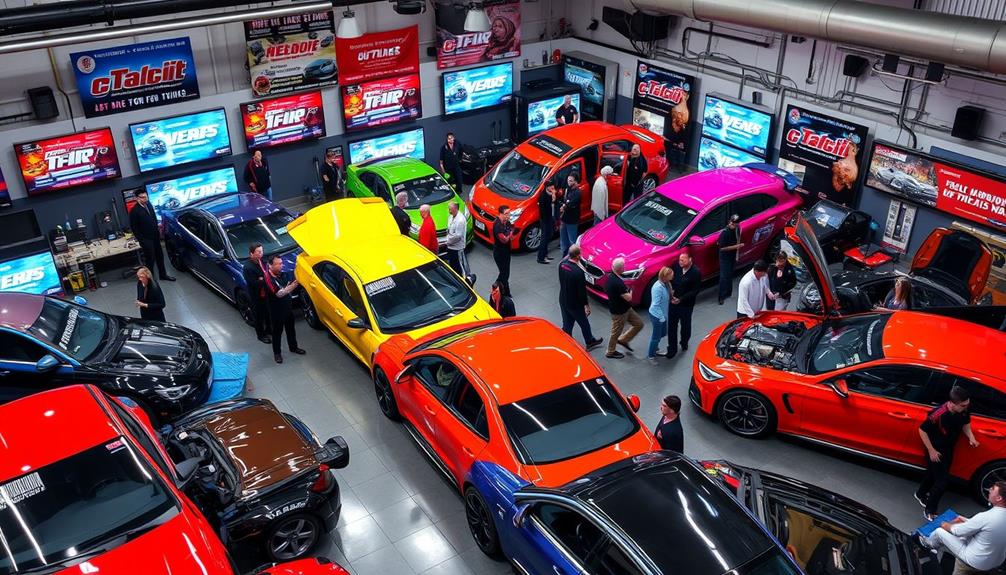
To grow your car tuning business, you need to harness effective digital marketing techniques and explore partnership opportunities.
Targeted online campaigns can boost your visibility, while collaborating with influencers can expand your reach considerably.
Digital Marketing Techniques
Digital marketing techniques are essential for car tuning businesses looking to thrive in a competitive landscape. By utilizing targeted online advertising, you can reach niche markets of automotive enthusiasts and potentially achieve an impressive return on investment (ROI) of up to 200%.
Effective strategies like creating a personal budget can also help you allocate funds wisely for marketing efforts. Engaging content marketing, like blogs and videos showcasing your tuning projects, can boost website traffic by 45%, enhancing your brand visibility and customer engagement.
Social media platforms, especially Instagram and Facebook, are powerful tools for your business. About 60% of consumers discover new automotive products through these channels, so make sure to maintain an active presence.
You can also harness the effectiveness of email marketing campaigns, which can achieve open rates as high as 20%, allowing you to promote special offers and new service launches directly to your audience.
Leveraging customer testimonials and reviews on online platforms can greatly enhance your credibility. This strategy can lead to a remarkable 70% increase in conversion rates for your tuning services.
Partnership Opportunities
Building on your digital marketing efforts, exploring partnership opportunities can greatly enhance your car tuning business's growth. Collaborating with local automotive clubs and events boosts brand visibility, attracting a dedicated customer base—70% of car enthusiasts engage in community activities related to tuning.
Additionally, engaging with reputable precious metal investment options can provide financial insights that may aid in funding your business expansion. Establishing partnerships with performance parts suppliers not only provides exclusive discounts but can increase your profit margins by up to 20% on aftermarket components.
Utilizing influencer marketing can also be a game changer. Reports show that every dollar spent on influencers yields an average ROI of $6.50, driving engagement and sales. Implementing referral programs that reward customers for bringing in new clients enhances customer loyalty, potentially increasing sales by 25%.
Additionally, forming alliances with local repair shops creates a mutually beneficial referral system, leveraging their existing customer networks to expand your reach. This strategy can contribute to an estimated 15% boost in business growth.
Future Opportunities in Tuning
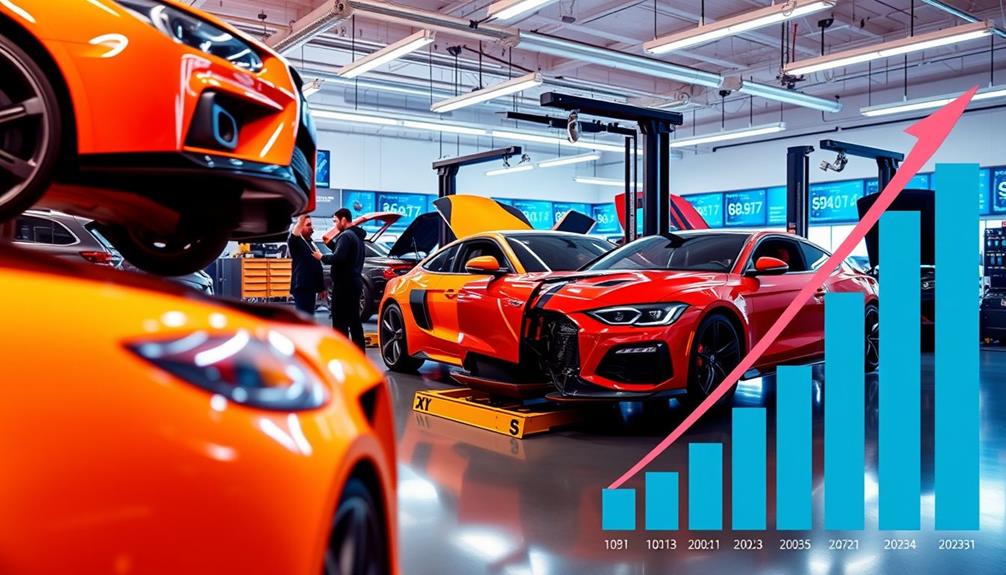
Exploring future opportunities in the car tuning industry reveals a landscape rich with potential.
With the global car tuning market projected to hit USD 12 billion by 2033, there's significant market growth and profit potential for car tuning businesses. Here are some key areas to evaluate:
- Aftermarket Tuning Demand: The anticipated CAGR of 6.4% reflects growing consumer interest in vehicle personalization and performance enhancements, making it a lucrative niche.
- Emerging Markets: Regions like Asia-Pacific and Latin America present untapped opportunities. Rising disposable incomes mean customers are more willing to invest in vehicle modifications.
- Electric Vehicle Tuning: As electric vehicles gain traction, there's a shift towards software enhancements and performance optimization, allowing you to adapt your services to new automotive trends.
- Motorsports Engagement: The increasing popularity of motorsports and car shows offers car tuning businesses a chance to connect with enthusiasts and showcase innovative products.
Frequently Asked Questions
How Much Money Can You Make Tuning Cars?
You can make a decent income tuning cars, with annual revenues ranging from $50,000 to $200,000. Your profit margins can be significant, especially if you cater to passionate car enthusiasts seeking performance upgrades or aesthetic modifications.
How Much Does an Auto Tuner Make?
Picture yourself under the hood, fine-tuning engines. As an auto tuner, you could earn between $40,000 to $150,000 annually, depending on your skills and clientele, with extra income from performance parts and services.
Are Car Tuners in Demand?
Yes, car tuners are in demand. Consumers love personalizing their vehicles, and emerging markets are growing rapidly. With the rise of electric vehicles, tuning opportunities are expanding, ensuring a bright future for the industry.
What Is the Future of Automotive Tuning?
The future of automotive tuning looks bright. You'll see innovations like smart technology and electric vehicle modifications, creating exciting customization opportunities. Plus, consumer demand for performance and eco-friendly options will continue driving the market forward.
Conclusion
To sum up, starting a car tuning business can be financially rewarding, especially with the right strategies in place. Did you know that the global automotive aftermarket is projected to reach $1 trillion by 2027? This statistic highlights the growing demand for tuning services. By understanding your target demographics and staying ahead of market trends, you can tap into this lucrative industry and maximize your profit potential. Embrace the opportunities, and watch your business thrive!
